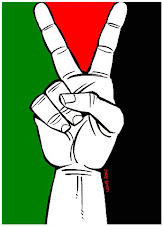It's time. Long past time. The best strategy to end the increasingly bloody occupation is for
Israel to become the target of the kind of global movement that put an end to apartheid in South Africa. In July 2005 a huge coalition of Palestinian groups laid out plans to do just that. They called on "people of conscience all over the world to impose broad boycotts and implement divestment initiatives against Israel similar to those applied to South Africa in the apartheid era". The campaign Boycott, Divestment and Sanctions was born.
Every day that Israel pounds
Gaza brings more converts to the BDS cause - even among Israeli Jews. In the midst of the assault roughly 500 Israelis, dozens of them well-known artists and scholars, sent a letter to foreign ambassadors in Israel. It calls for "the adoption of immediate restrictive measures and sanctions" and draws a clear parallel with the anti-apartheid struggle.
"The boycott on South Africa was effective, but Israel is handled with kid gloves ... This international backing must stop."
Yet even in the face of these clear calls, many of us still can't go there. The reasons are complex, emotional and understandable. But they simply aren't good enough. Economic sanctions are the most effective tool in the non-violent arsenal: surrendering them verges on active complicity. Here are the top four objections to the BDS strategy, followed by counter-arguments.
Punitive measures will alienate rather than persuade Israelis.
The world has tried what used to be called "constructive engagement". It has failed utterly. Since 2006 Israel has been steadily escalating its criminality: expanding settlements, launching an outrageous war against Lebanon, and imposing collective punishment on Gaza through the brutal blockade. Despite this escalation, Israel has not faced punitive measures - quite the opposite. The weapons and $3bn in annual aid the US sends Israel are only the beginning. Throughout this key period, Israel has enjoyed a dramatic improvement in its diplomatic, cultural and trade relations with a variety of other allies. For instance, in 2007 Israel became the first country outside Latin America to sign a free-trade deal with the Mercosur bloc. In the first nine months of 2008, Israeli exports to Canada went up 45%. A new deal with the EU is set to double Israel's exports of processed food. And in December European ministers "upgraded" the EU-Israel association agreement, a reward long sought by Jerusalem.
It is in this context that Israeli leaders started their latest war: confident they would face no meaningful costs. It is remarkable that over seven days of wartime trading, the Tel Aviv Stock Exchange's flagship index actually went up 10.7%. When carrots don't work, sticks are needed.
Israel is not South Africa.
Of course it isn't. The relevance of the South African model is that it proves BDS tactics can be effective when weaker measures (protests, petitions, backroom lobbying) fail. And there are deeply distressing echoes of apartheid in the occupied territories: the colour-coded IDs and travel permits, the bulldozed homes and forced displacement, the settler-only roads. Ronnie Kasrils, a prominent South African politician, said the architecture of segregation he saw in the West Bank and Gaza was "infinitely worse than apartheid". That was in 2007, before Israel began its full-scale war against the open-air prison that is Gaza.
Why single out Israel when the US, Britain and other western countries do the same things in Iraq and Afghanistan?
Boycott is not a dogma; it is a tactic. The reason the strategy should be tried is practical: in a country so small and trade-dependent, it could actually work.
Boycotts sever communication; we need more dialogue, not less.
This one I'll answer with a personal story. For eight years, my books have been published in Israel by a commercial house called Babel. But when I published The Shock Doctrine, I wanted to respect the boycott. On the advice of BDS activists, including the wonderful writer John Berger, I contacted a small publisher called Andalus. Andalus is an activist press, deeply involved in the anti-occupation movement and the only Israeli publisher devoted exclusively to translating Arabic writing into Hebrew. We drafted a contract that guarantees that all proceeds go to Andalus's work, and none to me. I am boycotting the Israeli economy but not Israelis.
Our modest publishing plan required dozens of phone calls, emails and instant messages, stretching between Tel Aviv, Ramallah, Paris, Toronto and Gaza City. My point is this: as soon as you start a boycott strategy, dialogue grows dramatically. The argument that boycotts will cut us off from one another is particularly specious given the array of cheap information technologies at our fingertips. We are drowning in ways to rant at each other across national boundaries. No boycott can stop us.
Just about now, many a proud Zionist is gearing up for major point-scoring: don't I know that many of these very hi-tech toys come from Israeli research parks, world leaders in infotech? True enough, but not all of them. Several days into Israel's Gaza assault, Richard Ramsey, managing director of a British telecom specialising in voice-over-internet services, sent an email to the Israeli tech firm MobileMax: "As a result of the Israeli government action in the last few days we will no longer be in a position to consider doing business with yourself or any other Israeli company."
Ramsey says his decision wasn't political; he just didn't want to lose customers. "We can't afford to lose any of our clients," he explains, "so it was purely commercially defensive."
It was this kind of cold business calculation that led many companies to pull out of South Africa two decades ago. And it's precisely the kind of calculation that is our most realistic hope of bringing justice, so long denied, to Palestine.
A version of this column was published in the Nation (
thenation.com)
naomiklein.orgguardian.co.uk © Guardian News and Media Limited 2009

 To Sign the petition please click: http://www.ipetitions.com/petition/YES2DURBANII?e
To Sign the petition please click: http://www.ipetitions.com/petition/YES2DURBANII?e
